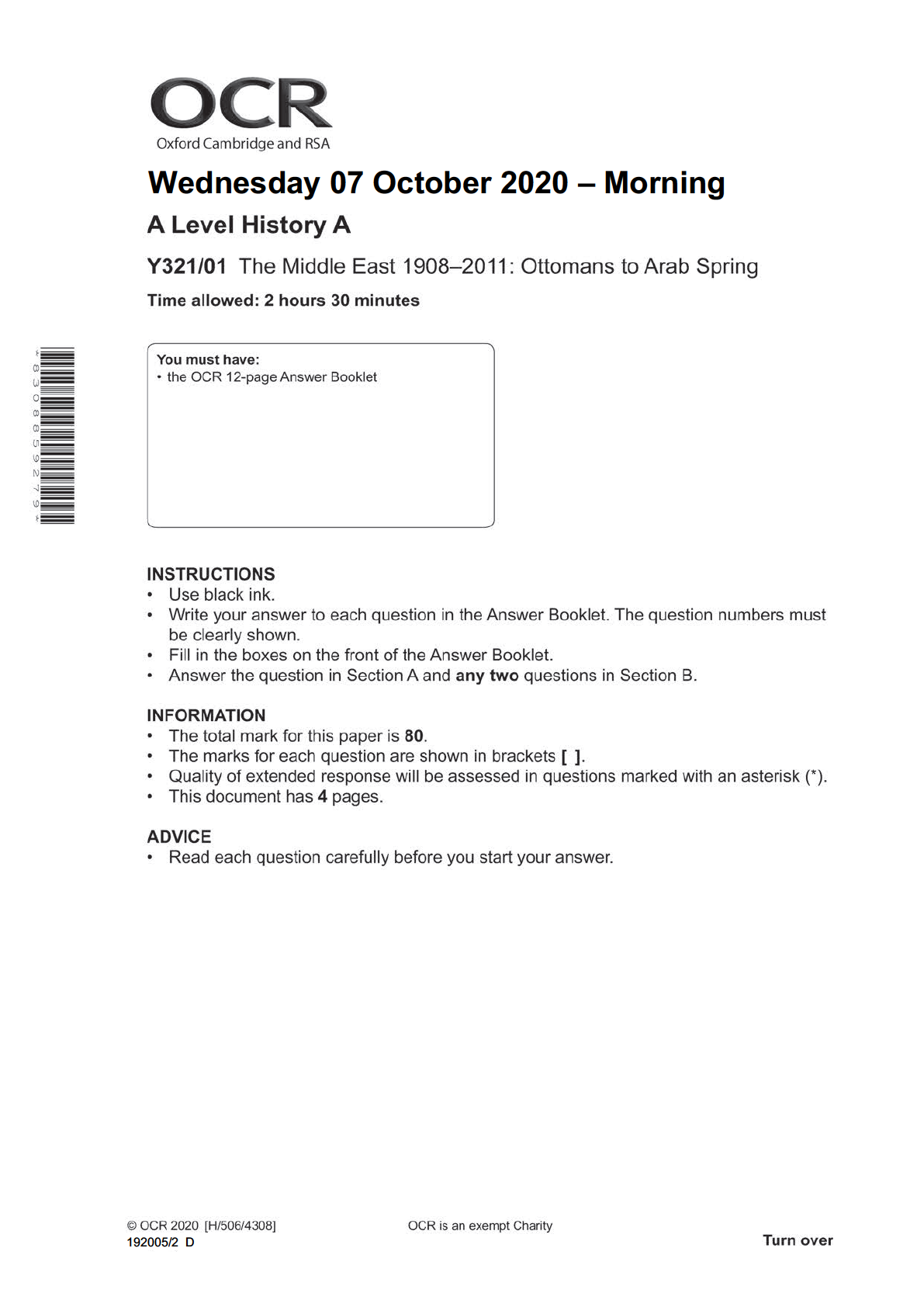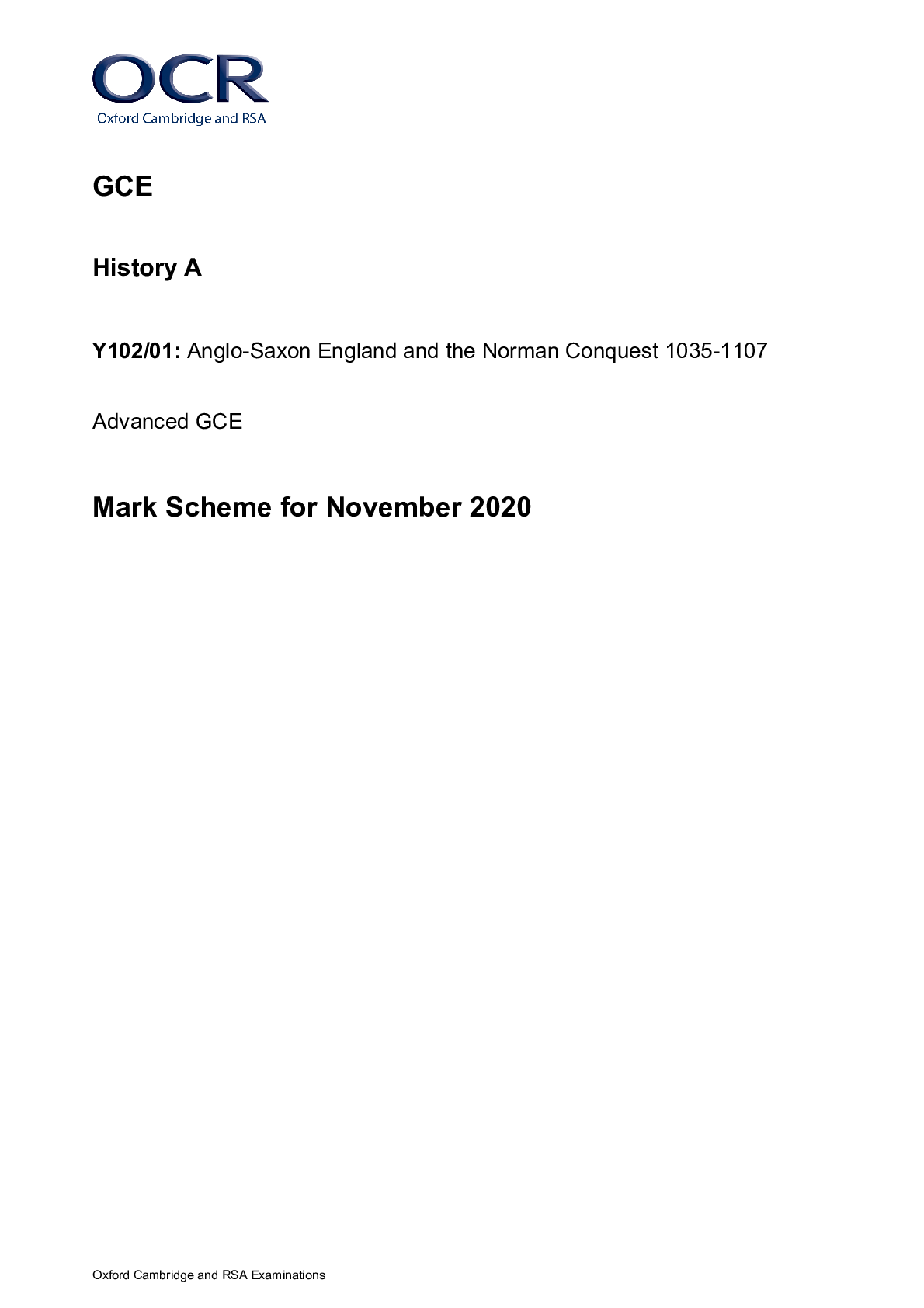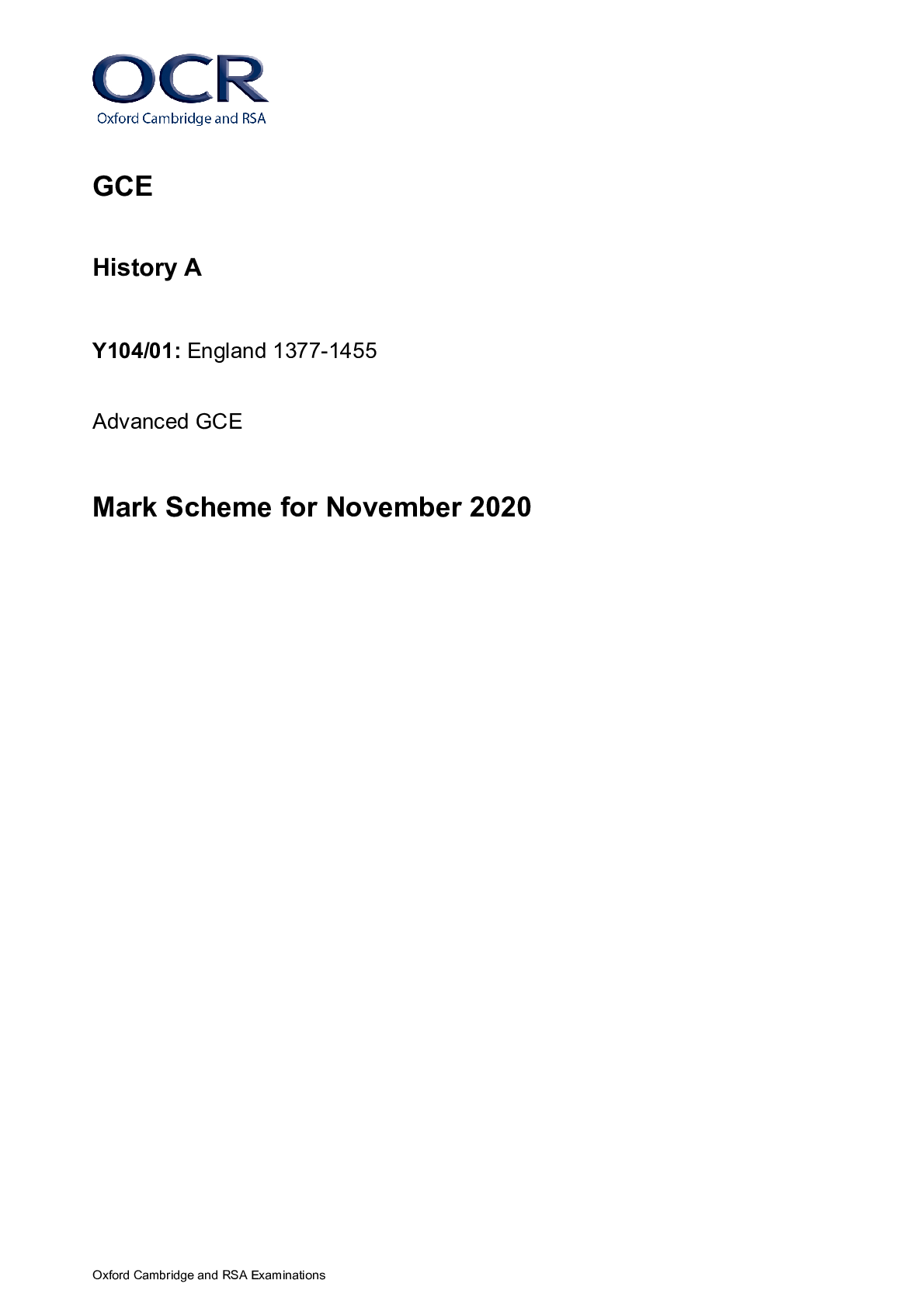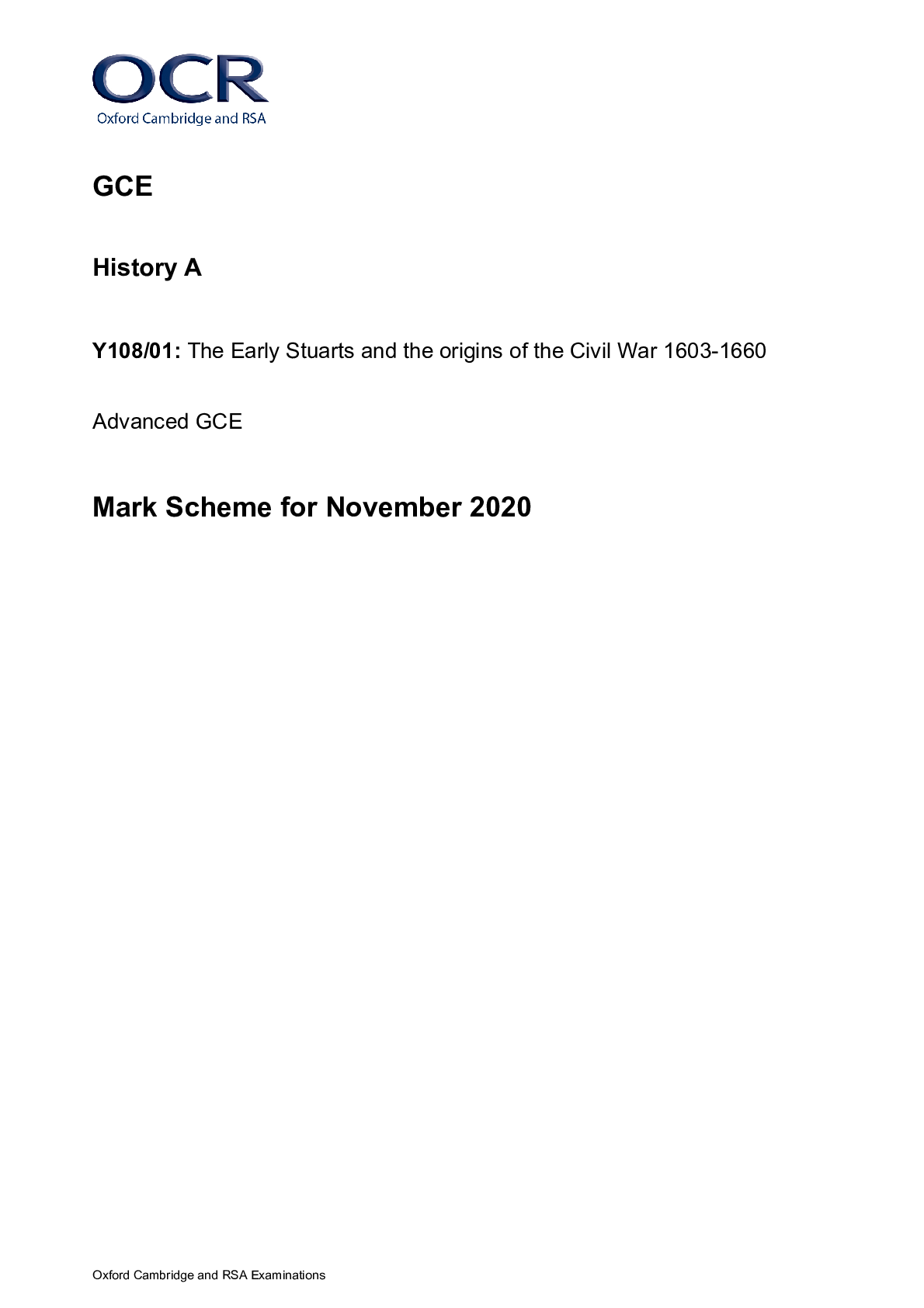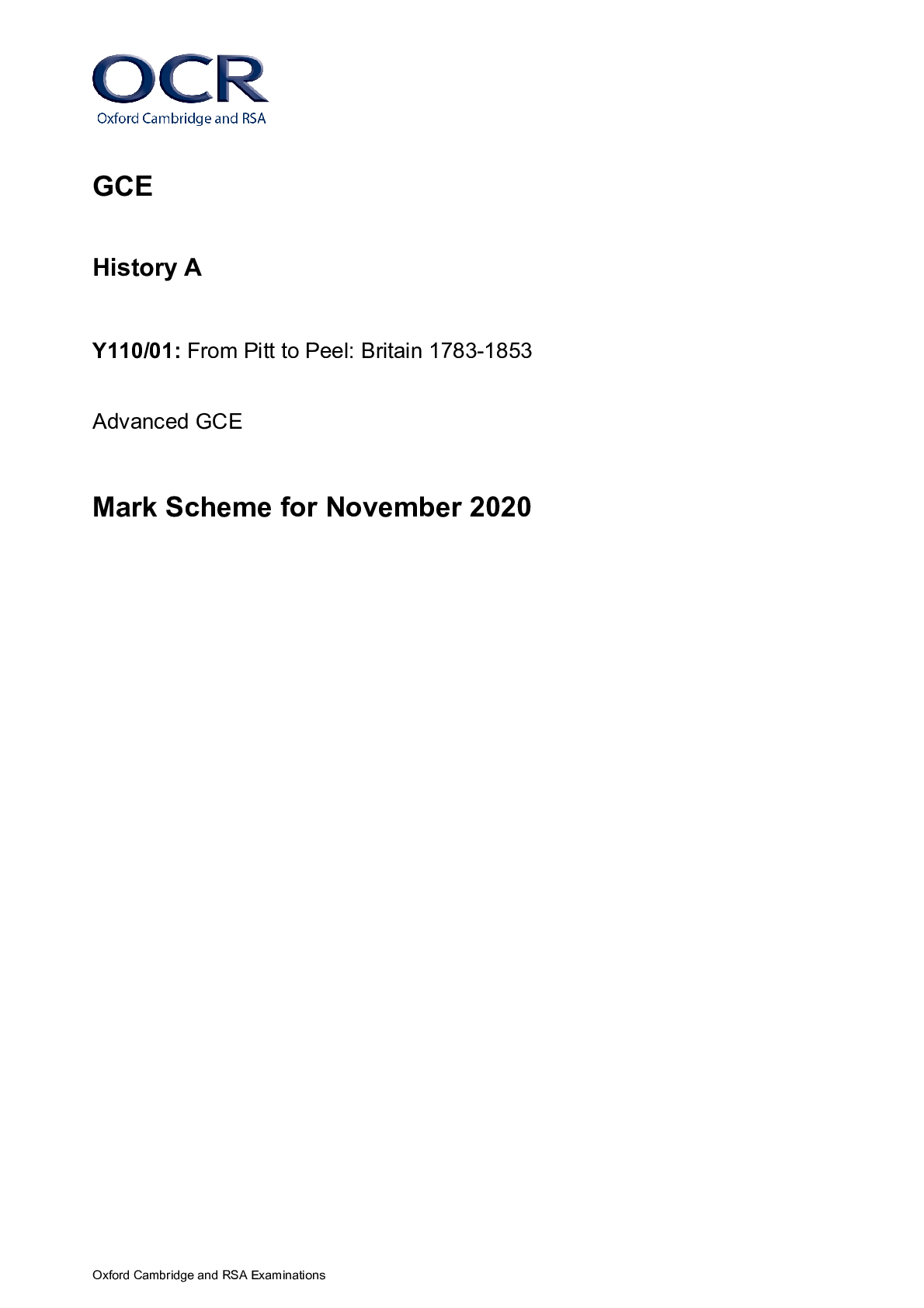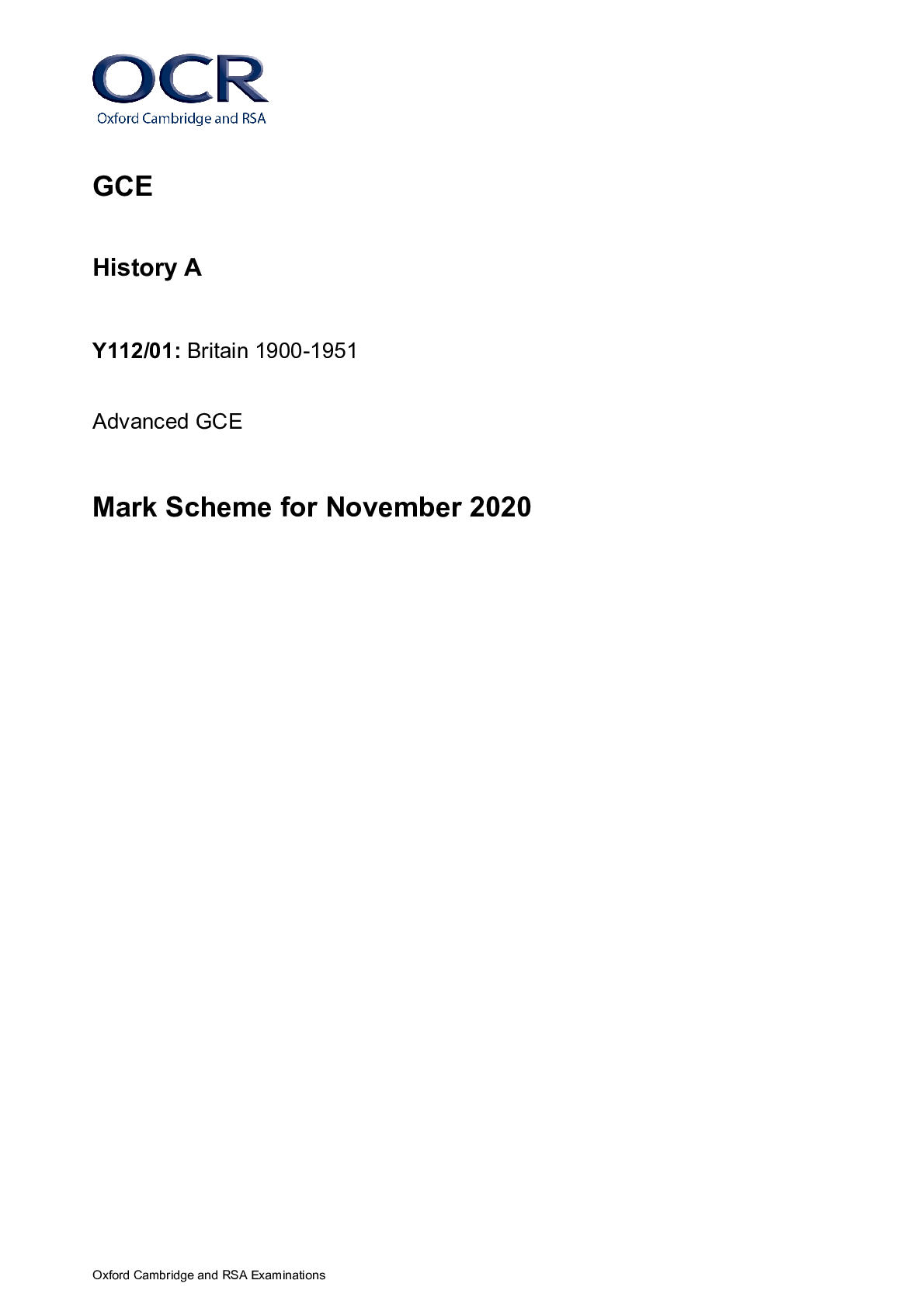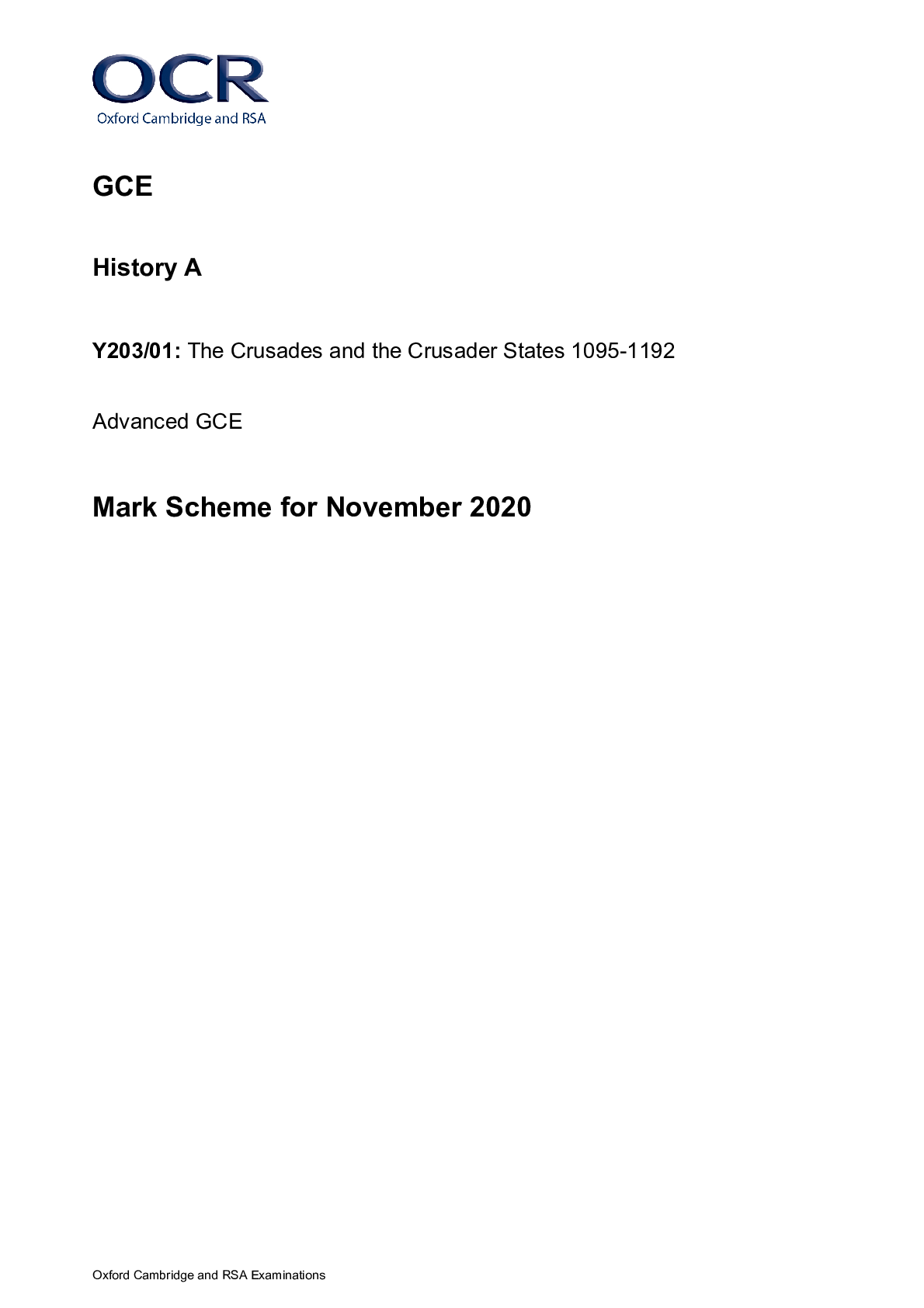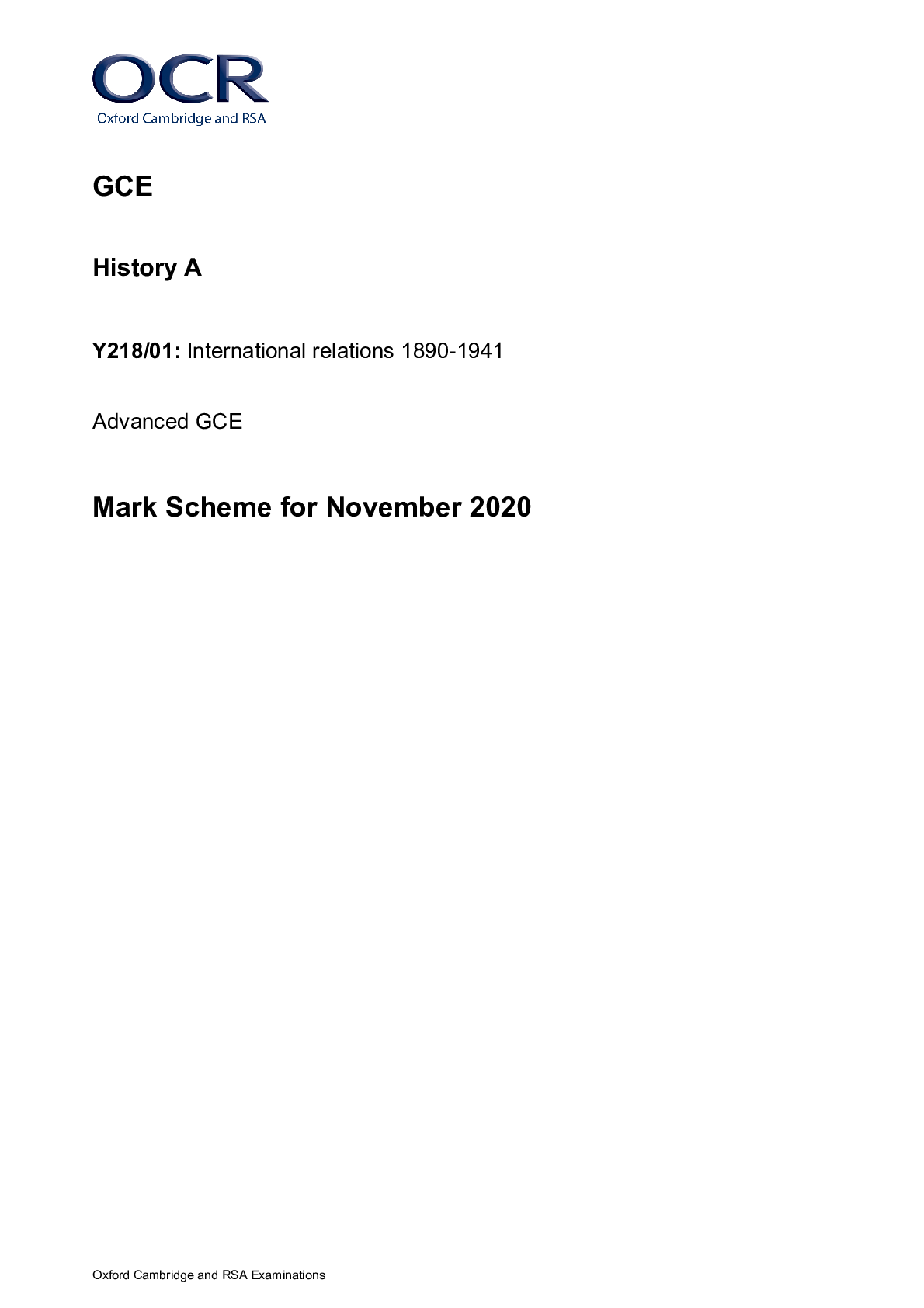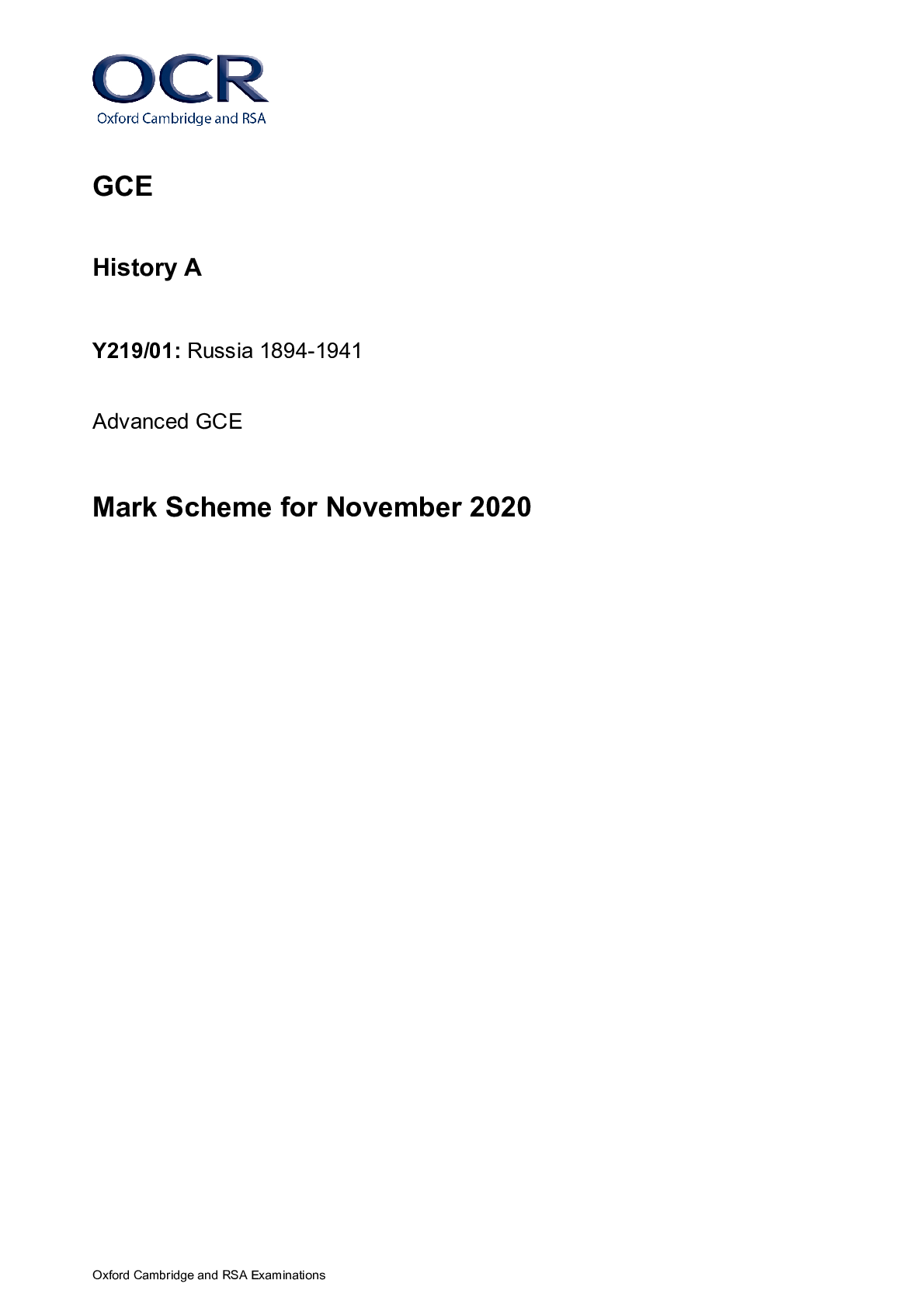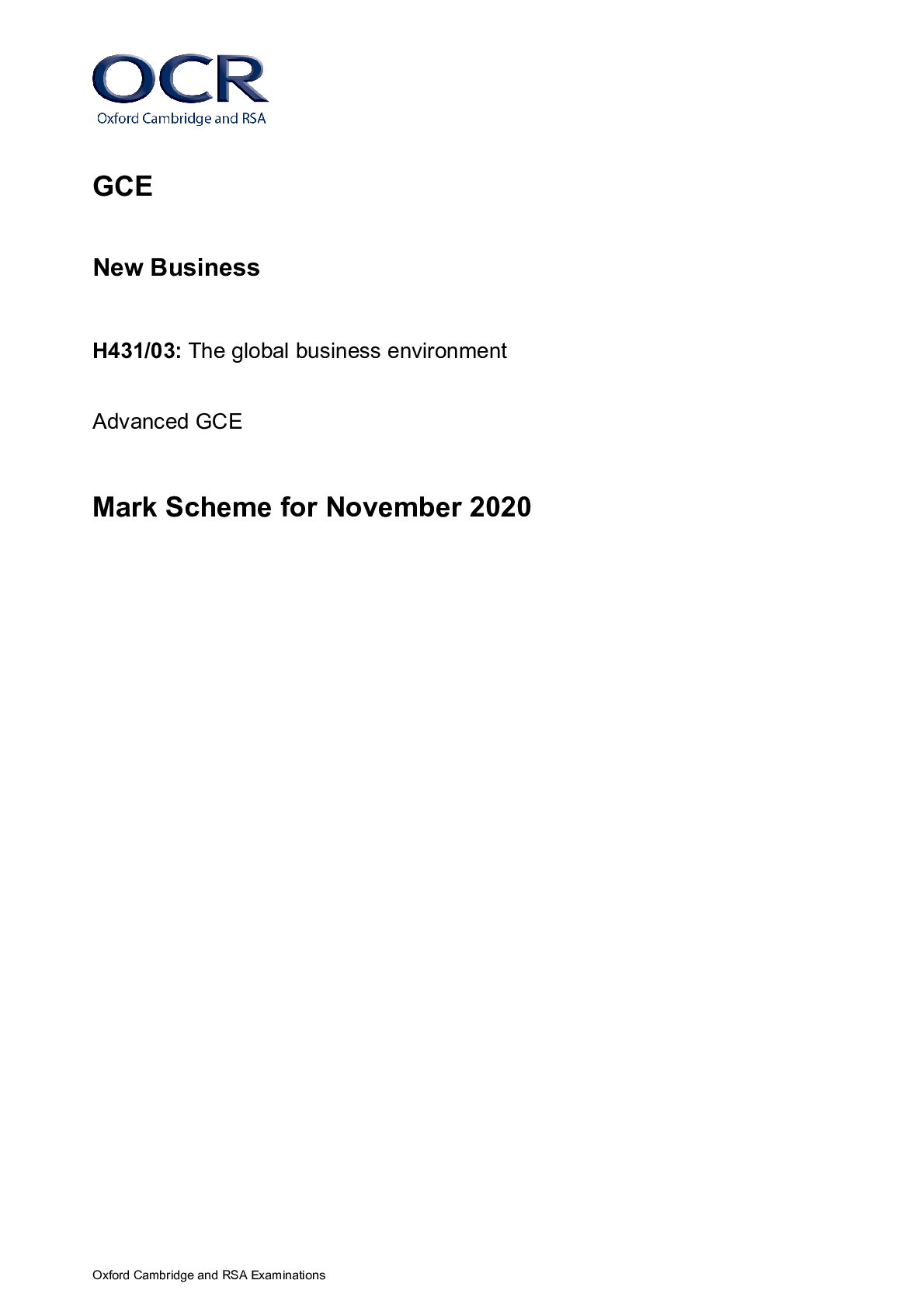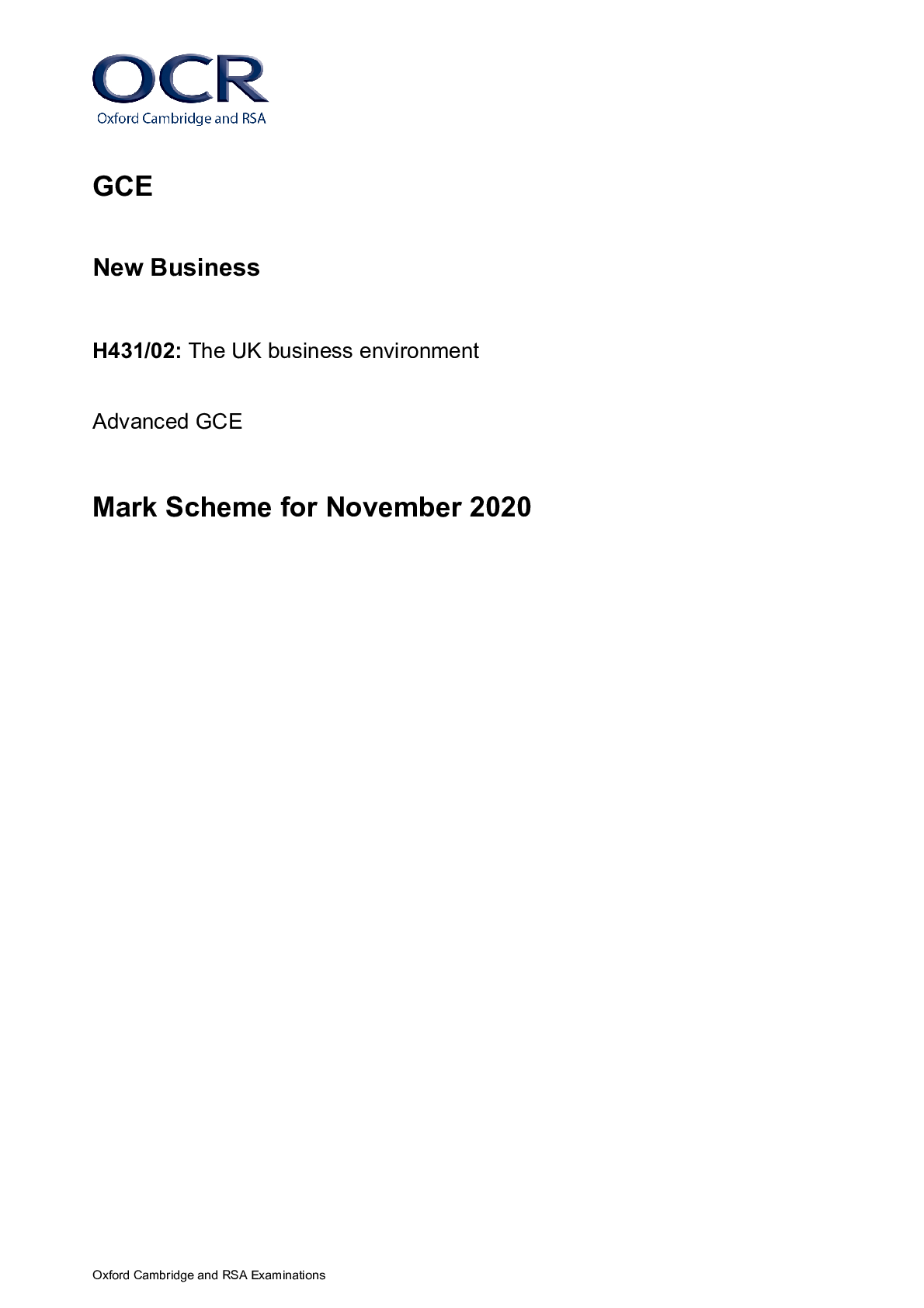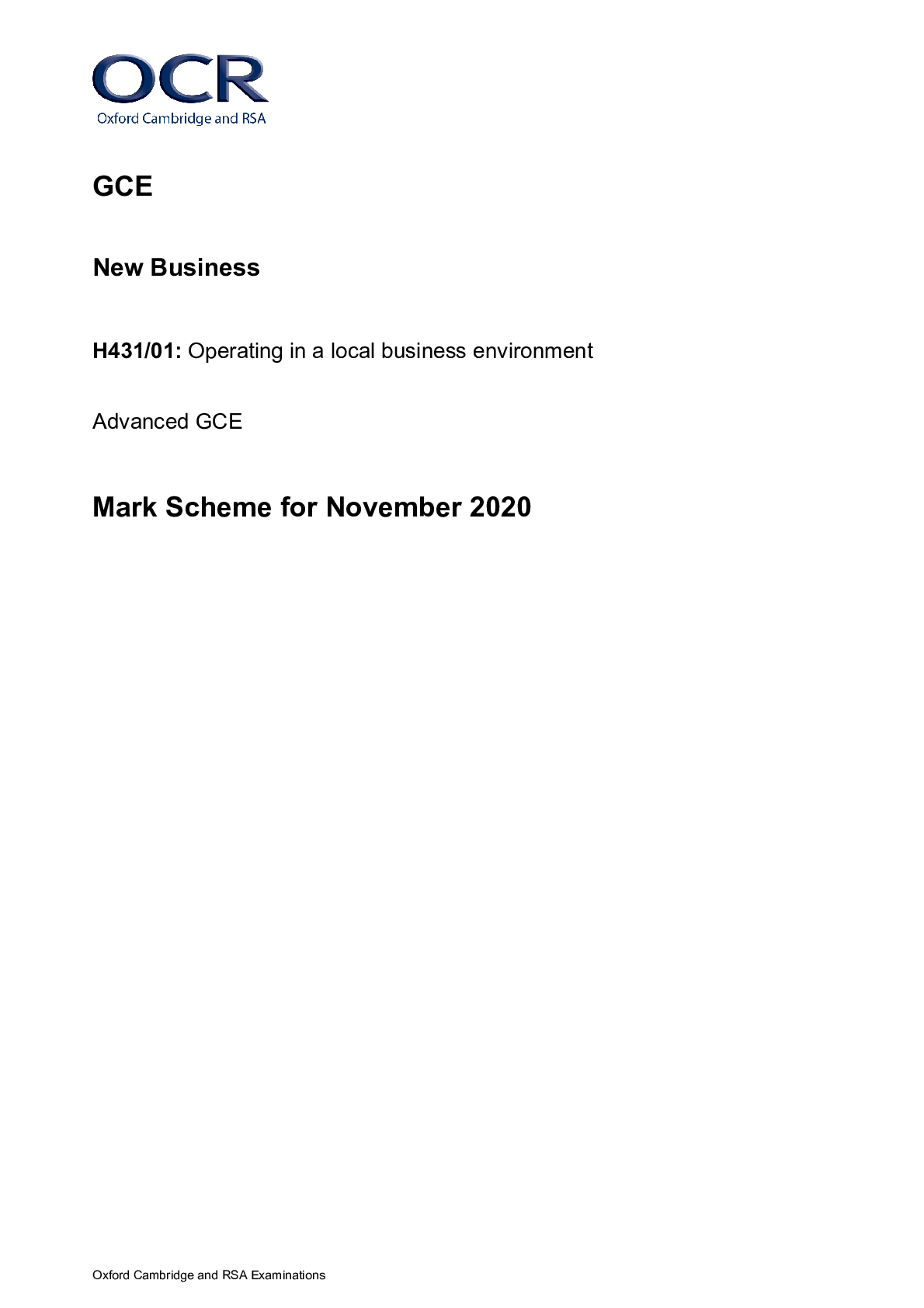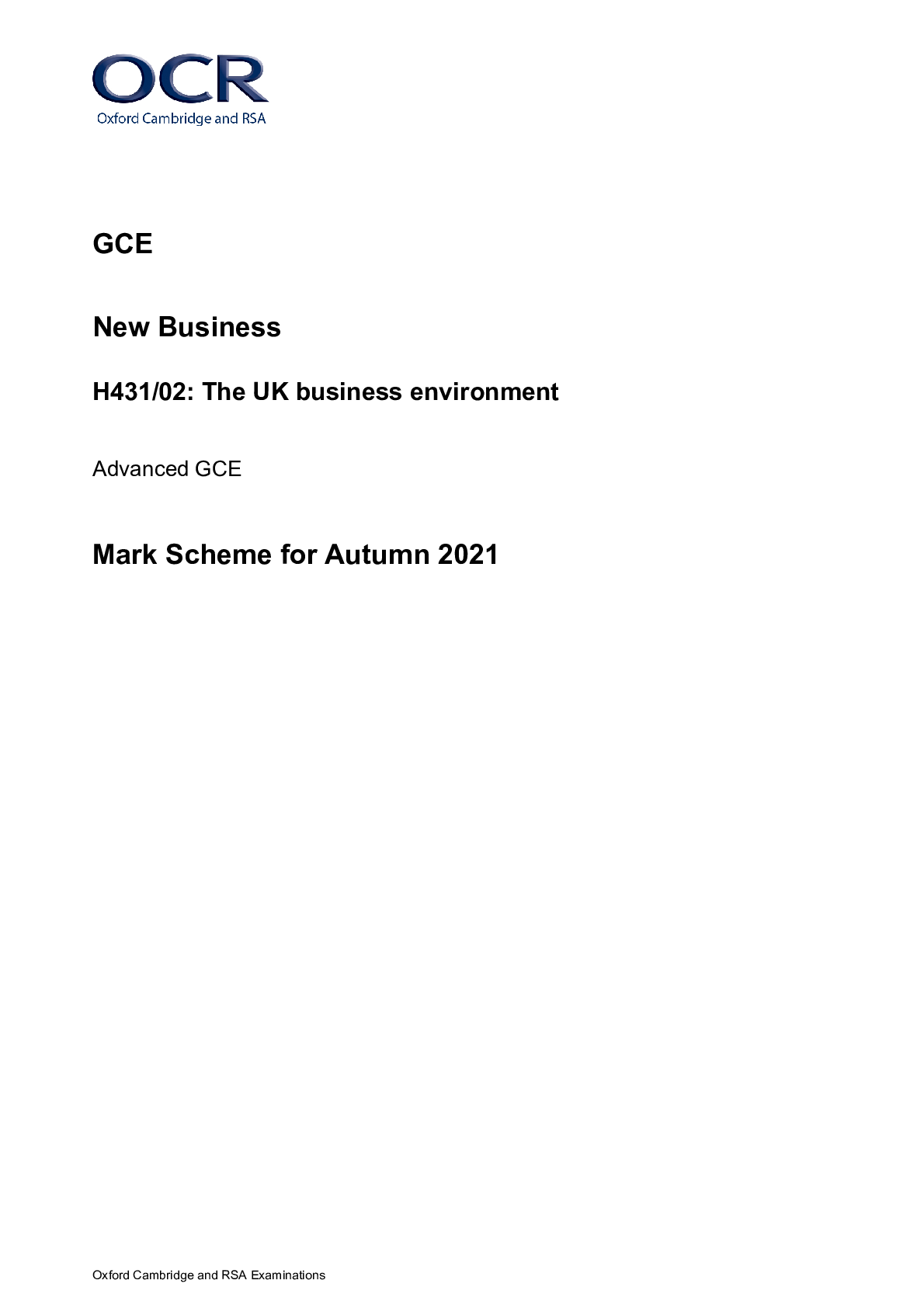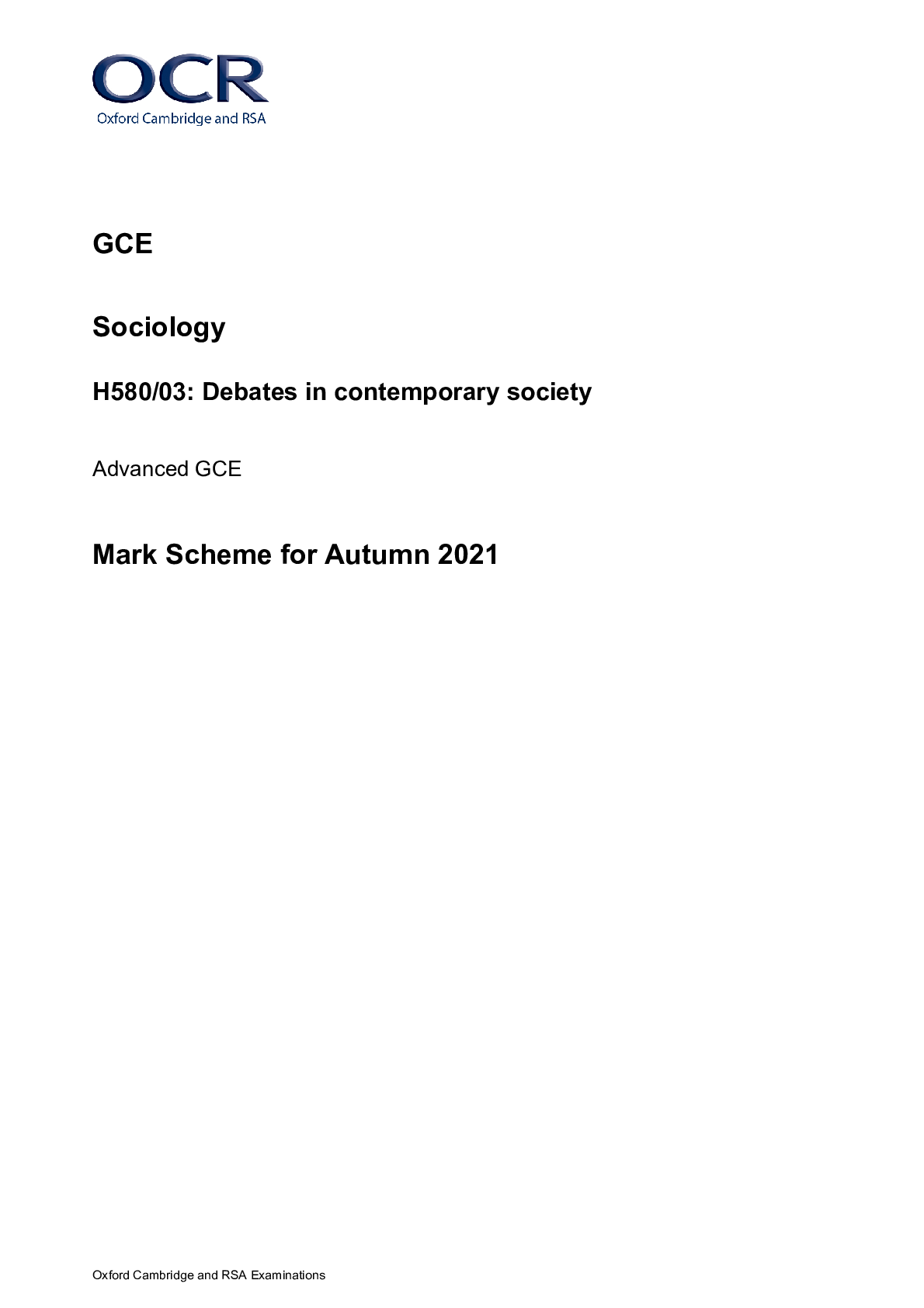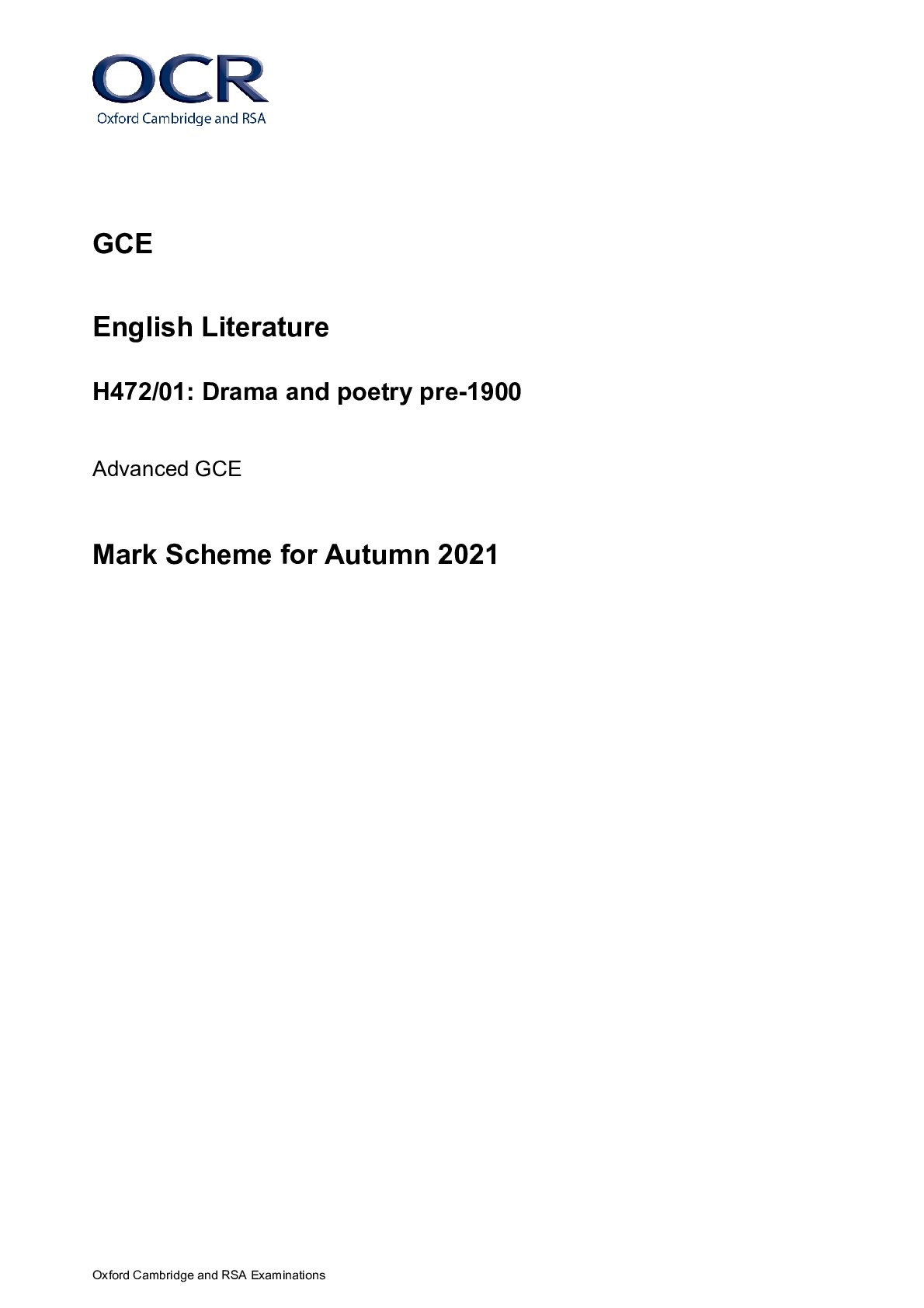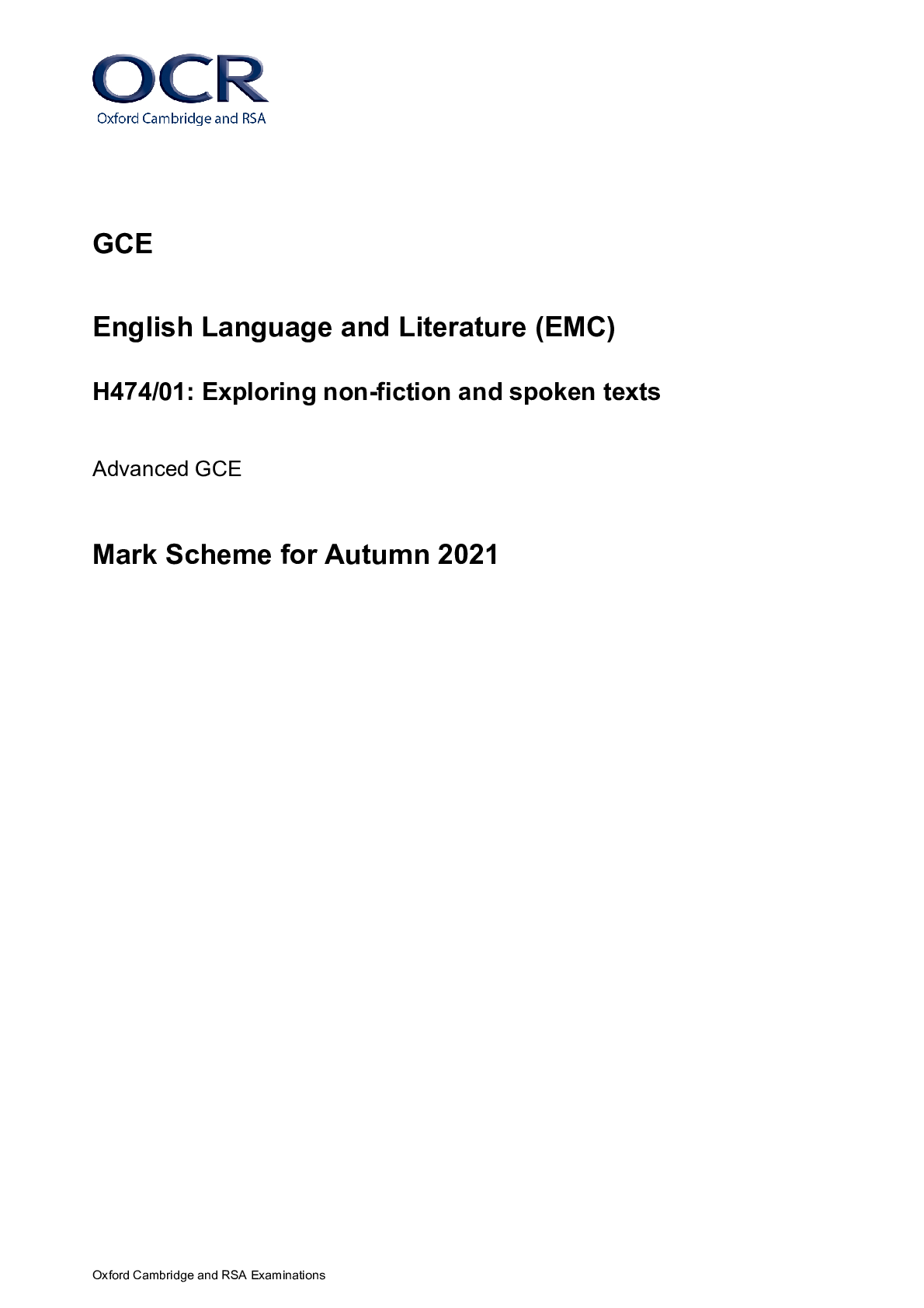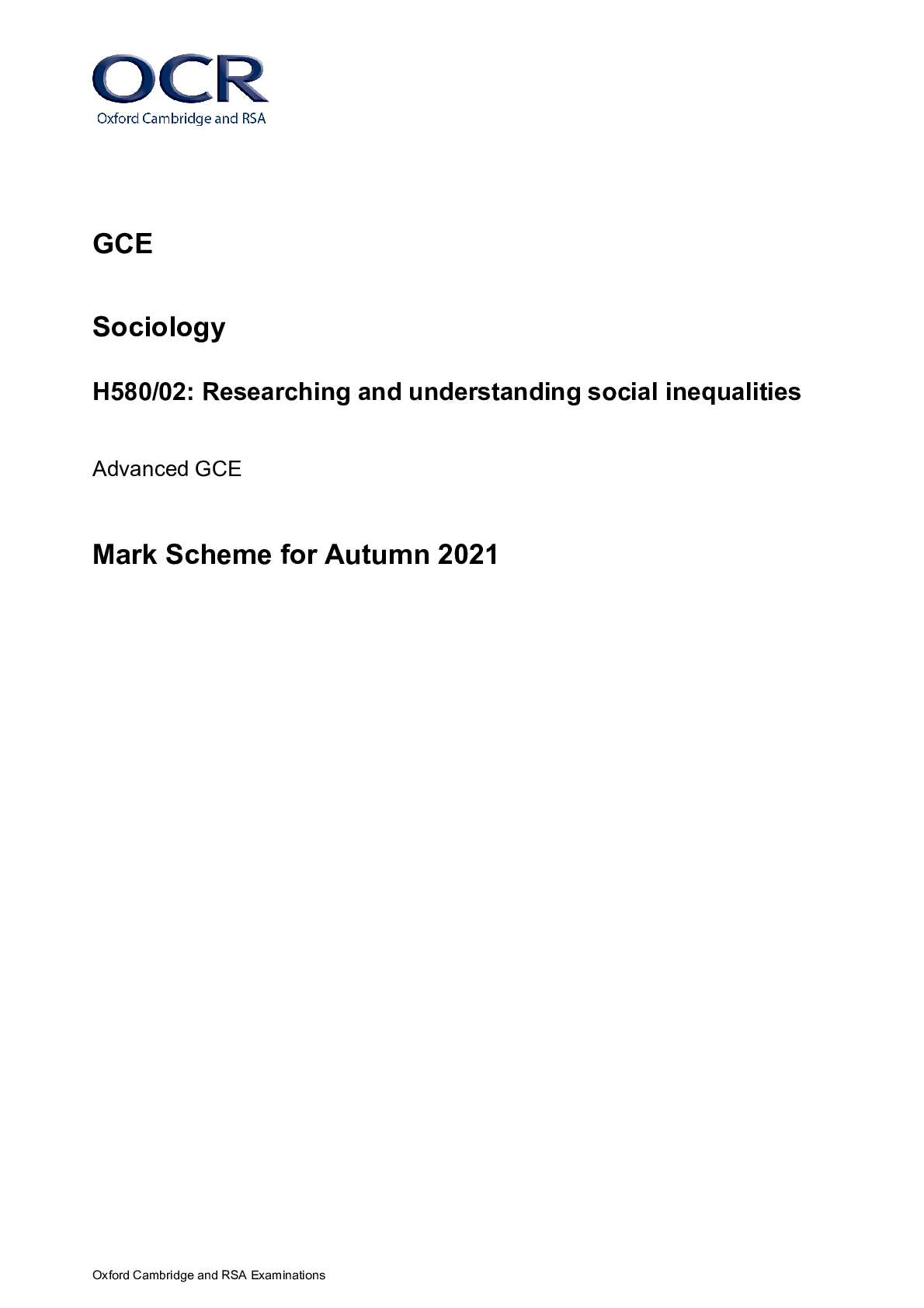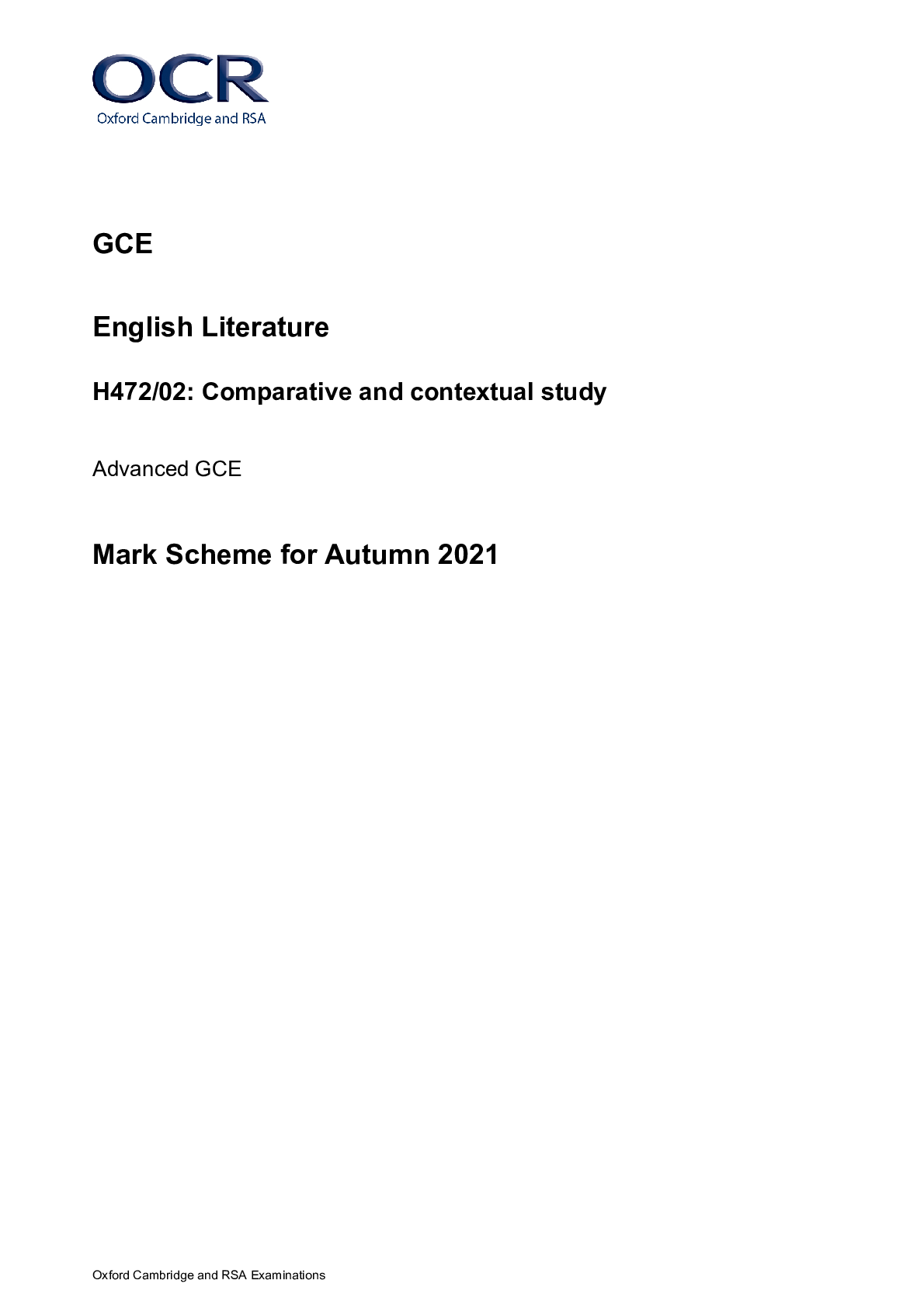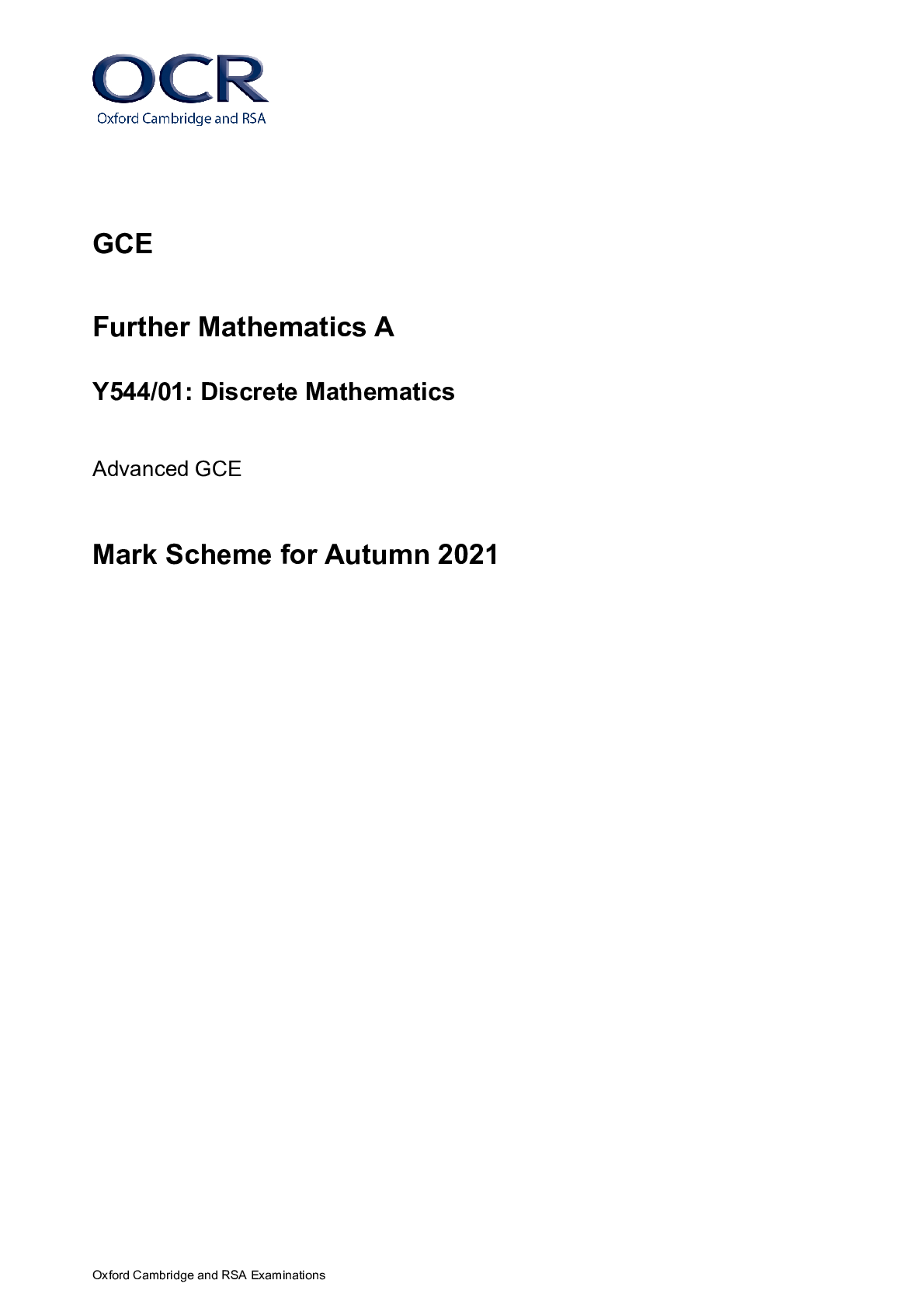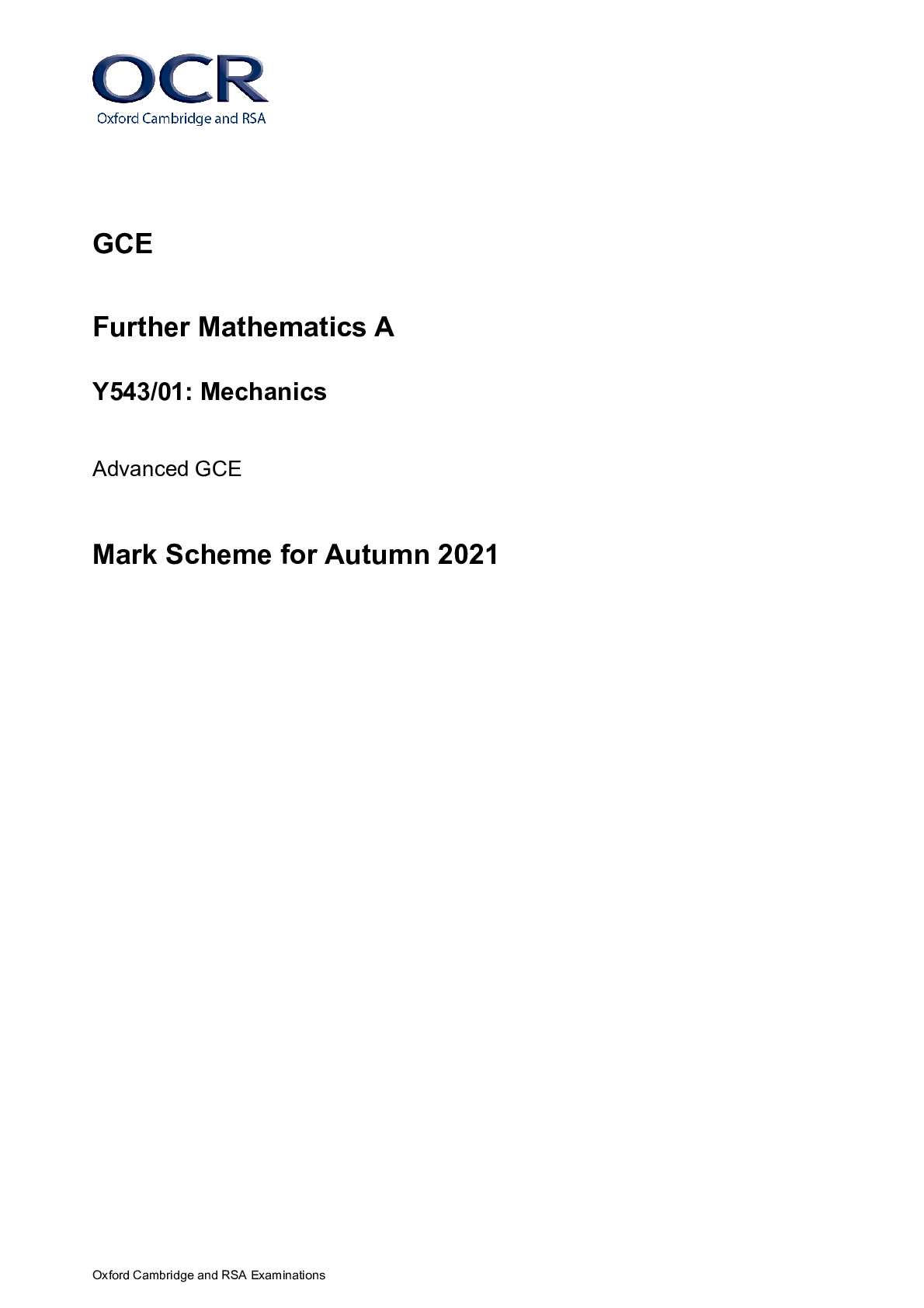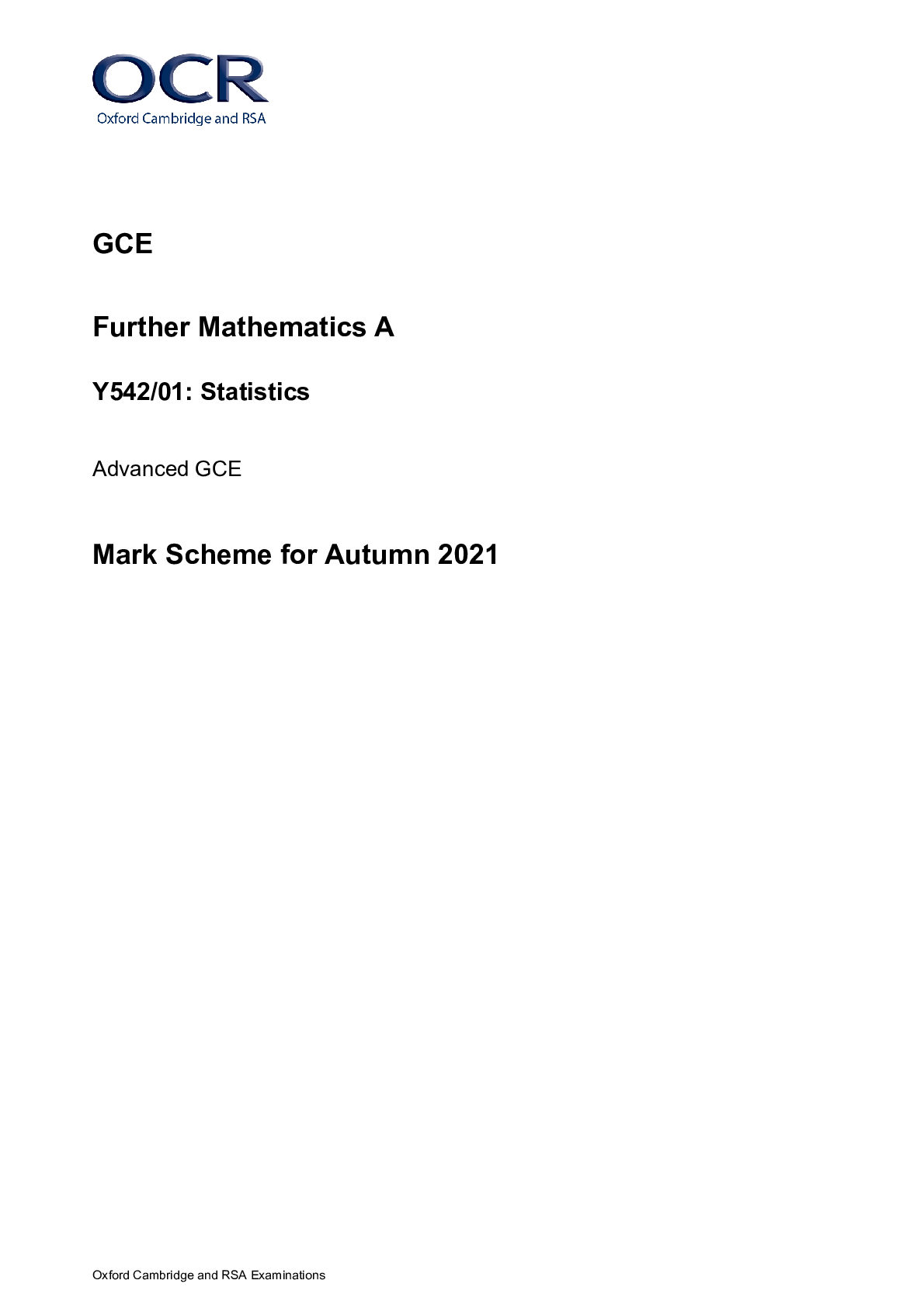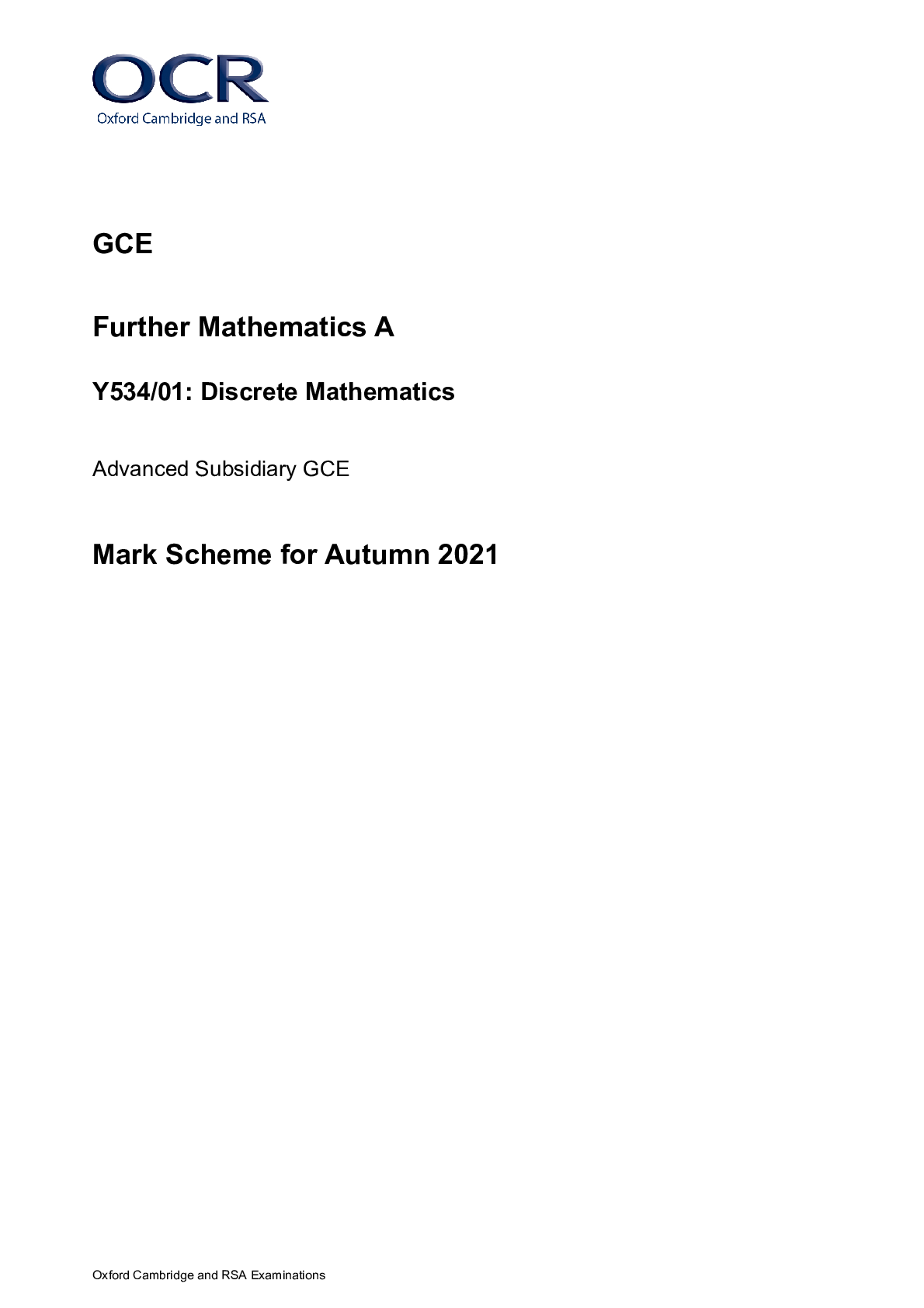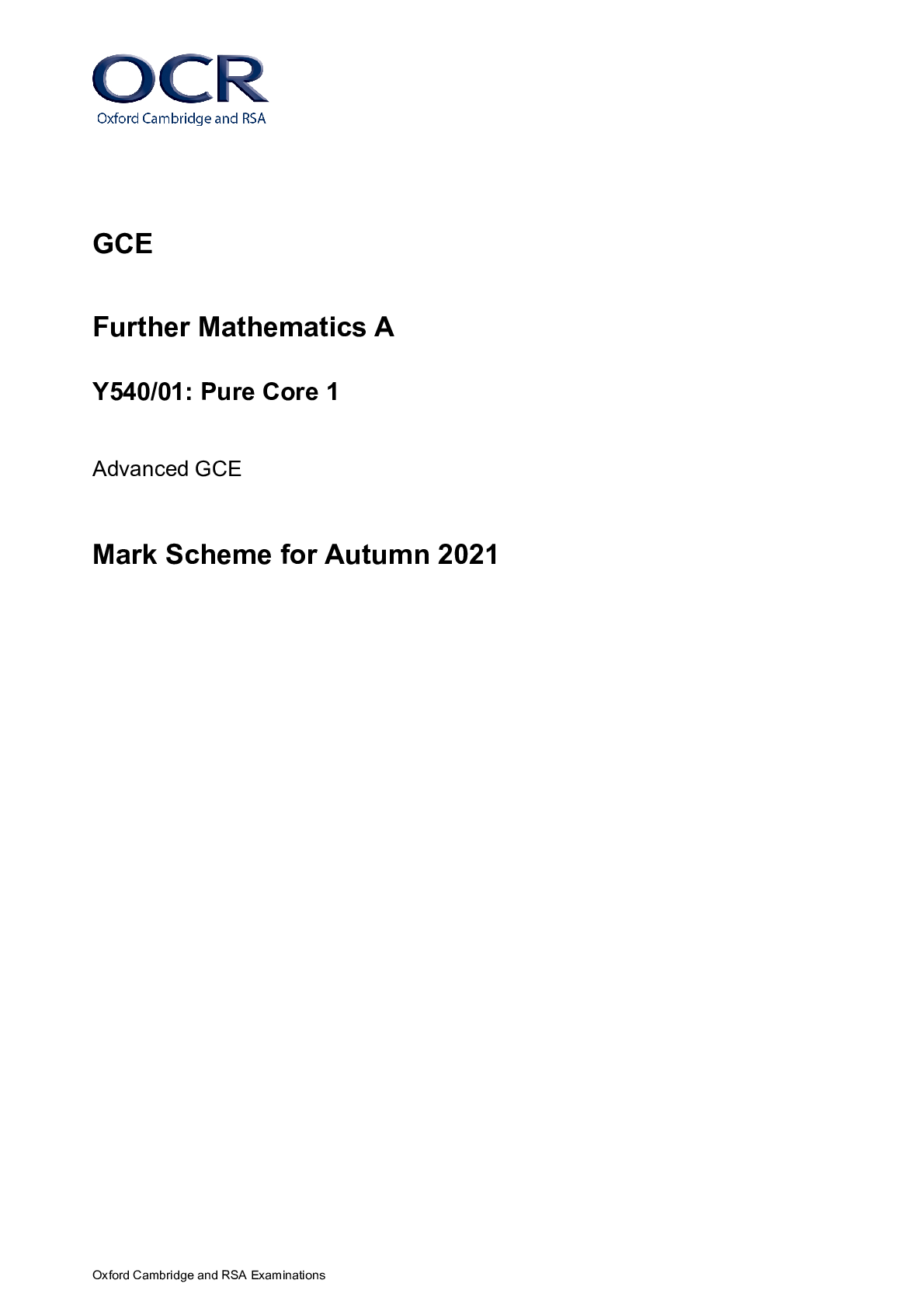History > MARK SCHEME > GCE History A Y222/01: The Cold War in Asia 1945-1993 Advanced GCE Mark Scheme for November 2020 (All)
GCE History A Y222/01: The Cold War in Asia 1945-1993 Advanced GCE Mark Scheme for November 2020
Document Content and Description Below
GCE History A Y222/01: The Cold War in Asia 1945-1993 Advanced GCE Mark Scheme for November 2020 Oxford Cambridge and RSA Examinations GCE History A Y222/01: The Cold War in Asia 1945-1993 Ad... vanced GCE Mark Scheme for November 2020Oxford Cambridge and RSA Examinations OCR (Oxford Cambridge and RSA) is a leading UK awarding body, providing a wide range of qualifications to meet the needs of candidates of all ages and abilities. OCR qualifications include AS/A Levels, Diplomas, GCSEs, Cambridge Nationals, Cambridge Technicals, Functional Skills, Key Skills, Entry Level qualifications, NVQs and vocational qualifications in areas such as IT, business, languages, teaching/training, administration and secretarial skills. It is also responsible for developing new specifications to meet national requirements and the needs of students and teachers. OCR is a not-for-profit organisation; any surplus made is invested back into the establishment to help towards the development of qualifications and support, which keep pace with the changing needs of today’s society. This mark scheme is published as an aid to teachers and students, to indicate the requirements of the examination. It shows the basis on which marks were awarded by examiners. It does not indicate the details of the discussions which took place at an examiners’ meeting before marking commenced. All examiners are instructed that alternative correct answers and unexpected approaches in candidates’ scripts must be given marks that fairly reflect the relevant knowledge and skills demonstrated. Mark schemes should be read in conjunction with the published question papers and the report on the examination. © OCR 2020Y222/01 Mark Scheme November 2020 2 Annotations Annotation Meaning of annotation Blank Page Highlight Off-page comment Assertion Analysis Evaluation Explanation Factor Illustrates/Describes Irrelevant, a significant amount of material that does not answer the question Judgement Knowledge and understanding Provenance Simple comment Unclear ViewY222/01 Mark Scheme November 2020 3 Subject Specific Marking Instructions Question Answer Marks Guidance 1 (a) Which of the following was of greater importance as a reason for the failure of the USA to win the war in Vietnam? (i) US military strategy (ii) The shortcomings of US soldiers Explain your answer with reference to both (i) and (ii). In dealing with US military strategy, • Answers might discuss the policy of ‘strategic hamlets’. • Answers might discuss the tactic of ‘search and destroy’. • Answers might argue that US forces did not adapt to guerrilla warfare and war plans were predicated on battles being conventional set pieces. • Answers might argue that the US was overly reliant on the use of helicopters which were vulnerable. • Answers might discuss the negative effects of US bombing campaigns: they failed to dent morale in North Vietnam and encouraged people there to join the NVA, did not prevent the movement of men and supplies along the Ho Chi Minh Trail and alienated many in South Vietnam. • Answers might discuss the failure of Vietnamisation • In dealing with the shortcomings of US soldiers, answers might argue that conscripts were reluctant soldiers. • Answers might explain that short-term service undermined their commitment. • Answers might argue that the brutality of US soldiers, including massacres of civilians, turned the population 10 • No set answer is expected. • Judgement must be supported by relevant and accurate material. • Only credit material relevant to the question. • Answers may deal with each factor in turn, then compare them to reach a judgement, or may take a continually comparative approach. Either approach is acceptable. • Knowledge must not be credited in isolation; it should only be credited where it is used as the basis for analysis and evaluation, in line with descriptions in the levels mark scheme.Y222/01 Mark Scheme November 2020 4 against them. • Answers might argue that soldiers were pampered in South Vietnam with too many home comforts imported for them. • Answers might argue that US soldiers struggled to cope with the conditions of heat, humidity and the nature of the war. 1 (b)* ‘The US defensive perimeter strategy was adopted to protect US economic and trade interests.’ How far do you agree? • In arguing that the US defensive perimeter strategy was adopted to protect US economic and trade interests, answers might point out that the area was the crossroads of the Indian and Pacific Oceans. • Answers might explain that Asia provided essential raw materials (90% of the world’s rubber, 60% of its tin, etc). • Answers might argue that Asian markets were an important outlet for US exports especially to places such as the Philippines and Japan. • Answers might argue that the perimeter was an insurance of access to the economic wealth of India and South East Asia in the event of the closure of the Suez Canal. • Answers might argue that the defensive line incorporated many trading ports. • Answers might argue it was a response to the any move by the USSR and China to close the economic ‘open door’. • In arguing that other reasons were important, answers might argue that the perimeter was intended to 20 • No set answer is expected. • At higher levels, candidates will focus on ‘how far’ but at Level 4 may simply list factors. • At Level 5 and above, there will be judgements as to the nature of the peace. • At higher levels, candidates might establish criteria against which to judge the peace. • To be valid judgements, claims must be supported by relevant and accurate material. If not, they are assertions. • Knowledge must not be credited in isolation; it should only be credited where it is used to analyse and evaluate the sources, in line with descriptions in the levels mark scheme.Y222/01 Mark Scheme November 2020 5 contain communism to the Asian mainland. • Answers might argue that the bases on the perimeter were intended as places from which attacks on the mainland might be launched. • Answers might argue that the US was engaged in the colonisation of land to build an empire. • Answers might explain that the US wanted to ensure capitalism and democracy. • Answers might argue that the perimeter was intended as a position from which nationalist anti-Communist movements on the mainland might be encouraged. • Answers might argue that the perimeter was regarded as a low-cost option at a time of military over-stretch. 2 (a) Which of the following was of greater importance as a reason for the defeat of France in Indo-China? (i) The strengths of the Viet Minh (ii) The weaknesses of the French Explain your answer with reference to both (i) and (ii). • In dealing with the strengths of the Viet Minh, answers might discuss the political leadership of Ho Chi Minh. • Answers might discuss the military leadership of Giap especially at Dien Bien Phu. • Answers might argue that the development of Vietnamese nationalism during the Second World War. • Answers might argue that from the resistance movement led by the Vietminh during the war that they gained experience of conflict. • Answers might argue that Viet Minh propaganda was effective in mobilising support. • Answers might argue that supplies from China, 10 • No set answer is expected. • Judgement must be supported by relevant and accurate material. • Only credit material relevant to the question. • Answers may deal with each factor in turn, then compare them to reach a judgement, or may take a continually comparative approach. Either approach is acceptable. • Knowledge must not be credited in isolation; it should only be credited where it is used as the basis for analysis and evaluation, in line with descriptions in the levels mark scheme.Y222/01 Mark Scheme November 2020 6 especially, anti-aircraft guns and heavy artillery, were vital. • In dealing with the weaknesses of the French, answers might argue that the French in Vietnam were isolated after the defeat of France to Germany in 1940. • Answers might argue that after 1945 a succession of minority governments in France meant there was no consistence of policy. • Answers might argue that French troops lacked the will to fight after 1949 and the French decision to set up a state in the north for the deposed emperor. • Answers might argue that the de Lattre line of defences in the North overextended French supply lines and they proved to be porous for the Viet Minh. • Answers might argue that Dien Bien Phu exposed the poverty of French tactics. 2 (b)* To what extent was the outcome of the Korean War, up to 1977, favourable to the USA? • In arguing that the outcome of the Korean War was favourable to the US, answers might argue that communism was kept out of South Korea. • Answers might argue that South Korea became a US base and an ally. • Answers might argue that the USSR concluded that the cost of supporting North Korea was too high and made them more willing to compromise in future. • Answers might argue that America’s NATO allies were more willing to contribute to defence spending. • Answers might argue that the US was subsequently allowed to station ground, air and naval forces on Japan. 20 • No set answer is expected. • At higher levels, candidates will focus on ‘to what extent?’ but at Level 4 may simply list factors. • At Level 5 and above, there will be judgements as to the outcome of the war. • At higher levels, candidates might establish criteria against which to judge whether the outcome was favourable. • To be valid judgements, claims must be supported by relevant and accurate material. If not, they are assertions. • Knowledge must not be credited in isolation; it should only be credited where it is used to analyse and evaluate the sources, in line withY222/01 Mark Scheme November 2020 7 • Answers might argue that the war was exploited by the US to promote its anti-communist policies. • In arguing that the outcome of the Korean War was unfavourable to the USA, answers might argue that it showed that the threat of nuclear weapons was a ‘paper tiger’. • Answers might argue that the intervention of the Chinese concerned politicians and public opinion in the USA to such an extent that government policy was more closely monitored. • Answers might argue that North Korea remained a communist state with close ties to USSR and China. • Answers might discuss the fact that the US embarked on a costly programme of rapid rearmament. • Answers might argue that the image of the USA was damaged as it was accused of neo-colonialism. • Answers might argue that it marked a shift in strategy away from the perimeter defence strategy to one of military intervention on the mainland which led it into Vietnam shortly afterwards. descriptions in the levels mark scheme.OCR (Oxford Cambridge and RSA Examinations) The Triangle Building Shaftesbury Road Cambridge CB2 8EA [Show More]
Last updated: 1 year ago
Preview 1 out of 9 pages

Reviews( 0 )
Document information
Connected school, study & course
About the document
Uploaded On
Jul 17, 2022
Number of pages
9
Written in
Additional information
This document has been written for:
Uploaded
Jul 17, 2022
Downloads
0
Views
72

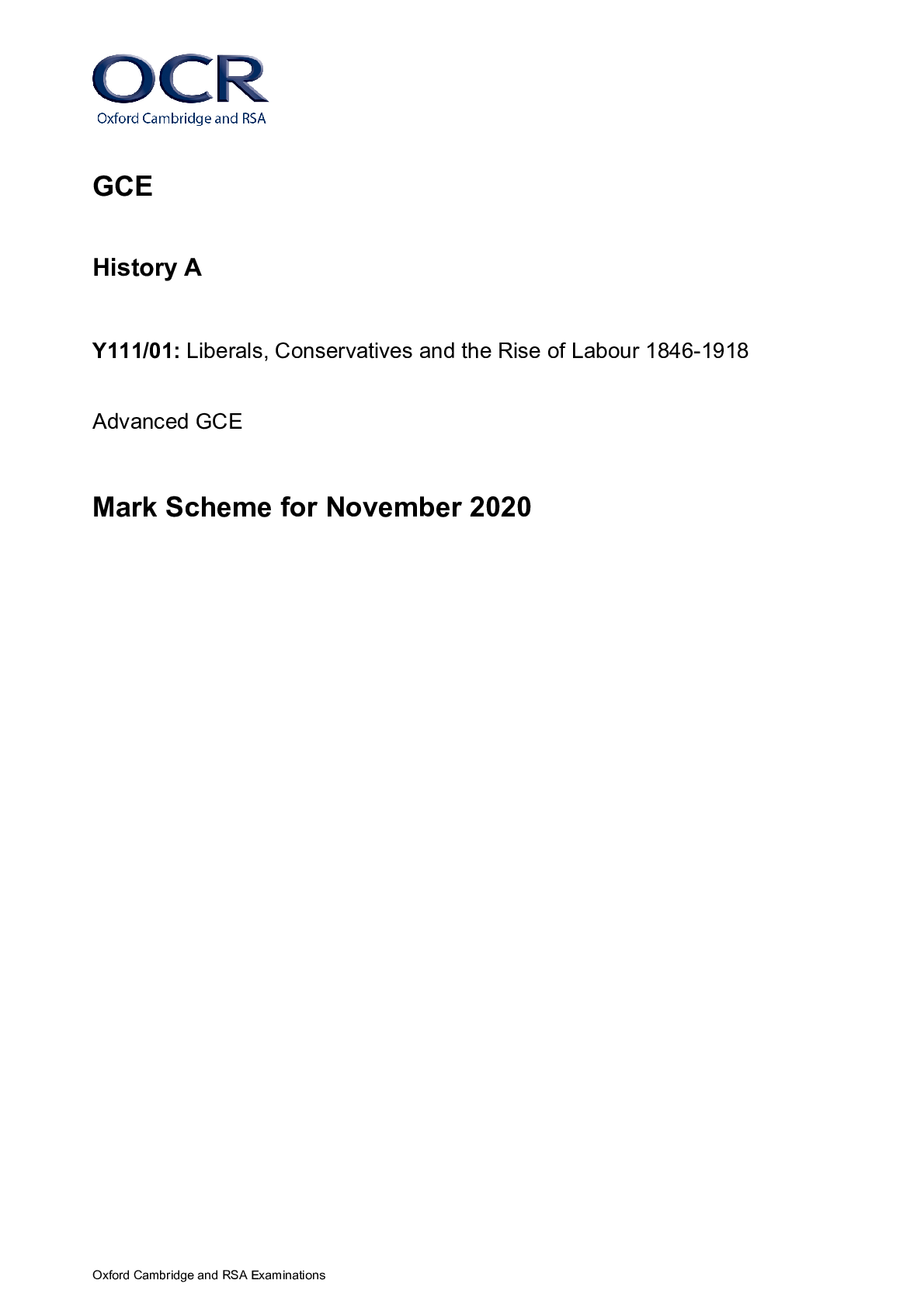
.png)
